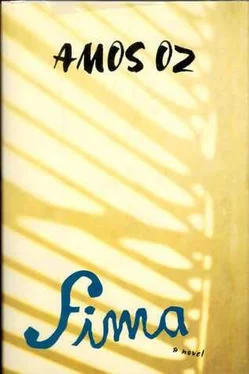"Okay," said Ted. "Fine. Come right on up. Just bear in mind that we're a bit busy this evening."
Fima took this as a hint that he shouldn't come, and that whatever happened he shouldn't stay till past midnight as he usually did. He was not offended; he even gallantly offered to come some other time. But Ted firmly and politely stood his ground.
"Half an hour will be fine."
Fima was particularly glad it was not raining, since he had no umbrella, and he did not want to visit the woman he loved looking like a drowned dog. He also noticed that it was getting colder, and decided that it might snow. This made him even happier. Through the window of the bus, somewhere near Mahane Yehuda Market, by the light of a street lamp, he saw a black slogan scrawled on a wall: ARABS OUT! Translating into German and substituting Jews for Arabs, he felt an upsurge of rage. On the spot, he appointed himself president and decided on a dramatic step. He would make an official visit to the Arab village of Deir Yassin on the anniversary of the massacre there and deliver a simple, trenchant statement amid the ruins of the village: Without going into the details of which side is more to blame, we Israeli Jews understand the depth of the suffering that the Palestinian Arabs have undergone during these past forty years, and to put an end to it we are willing to do anything that is reasonable, short of committing suicide. Such a speech would immediately echo through every Arab hovel; it would fire the imagination and might help to start the ball rolling. For a moment Fima hesitated between "start the ball rolling" and "achieve a breakthrough." Which would make a better heading for the short article he intended to write next morning for the weekend paper? Then he rejected them both and dropped the idea of the article.
In the elevator, on the way up to the sixth-floor flat in Beit Hakerem, he made up his mind to be calm and cordial this time, to try to talk to Ted as equal to equal, even on political topics, though normally he was very quickly irritated by the other's way of talking, his slow, balanced speech, his American accent and sort of desiccated logicality, his way of buttoning and unbuttoning his expensive knit jacket, like an official spokesman from the State Department.
Fima stood at the door for a couple of minutes without pressing the bell. He rubbed his soles on the doormat so he wouldn't bring any mud into the flat. While he was in the middle of this ball-less game of soccer, the door opened, and Ted helped him out of his overcoat, which had been turned into a snare by the rip in the lining.
"What foul weather," Fima said.
Ted asked if it was raining outside.
Even though it had stopped before he left the clinic, Fima replied pathetically: "Raining? A deluge, more like."
Without waiting to be asked, he advanced straight into Ted's study, leaving a trail of damp footprints across the hall. He proceeded steadily between piles of books, diagrams, sketches, and printouts on the floor until his progress was blocked by the massive desk on which stood Ted's word processor. He peered without permission at a mysterious green-and-black graph that was flickering on the screen. Joking about his hopelessness with computers, he began to urge Ted politely, as if he himself were the host and the other the guest: "Sit down, Teddy, sit down; make yourself at home." And without hesitating he grabbed the office chair in front of the computer screen.
Ted asked what he would like to drink. Fima answered:
"Anything. A glass of water. Don't waste any time. Or some brandy. Or else something hot. It really doesn't matter. I've only dropped in for a moment anyway."
With his broad, slow accent, with the dryness of a telephone operator, without a question mark at the end of any of his sentences, Ted stated:
"Okay. I'll get you a brandy. And you're sure, positive, you've had some supper."
Fima had a sudden urge to lie, to say no, though actually he was dying of hunger. But he chose to restrain himself.
Ted, in the rocking chair, swathed himself in silence and tobacco smoke. Despite himself, Fima enjoyed the smell of the fine pipe tobacco. And he noticed that Ted was observing him calmly, with a faintly anthropological curiosity. He looked as though he would not raise an eyebrow if his guest suddenly burst out singing. Or crying. Instead of doing either, Fima remarked:
"So Yael's out and so is Dimi. I forgot to bring some chocolate for him."
"Right," said Ted, stifling a yawn. And he exhaled another cloud of pleasant blue smoke.
Fima fixed his eyes on the pile of computerized plans, flicked through them as though they were his own, and made a special point of comparing pages six and nine, as though he had just made the decision to qualify, instantly, as an aeronautical engineer himself.
"And what are you concocting for us here? A spacecraft that fires rubber bullets? Or a flying gravel gun?"
"It's a paper we're writing for a British journal. Something quite experimental, actually: jet-propelled vehicles. As you probably know, Yael and I have been working on that for quite a few years now. You've asked me several times to explain it to you, but after a couple of minutes you always beg me to stop. I'm committed to finishing this paper by the weekend. There's a deadline. Can't you teach me the Hebrew for 'committed' and 'deadline,' by the way? You must know, being a poet. Don't you?"
Fima, straining his brain, almost managed to remember the Hebrew equivalents of the two English words Ted had used. They seemed to be sniggering at him from the threshold of his memory, slipping between his fingers like playful kittens just when he had almost caught them. Then he remembered, and opened his mouth to reply, but they escaped from under his tongue and vanished again into the darkness. Embarrassed, he said:
"Can I do anything to help?"
"Thanks, Fima," Ted replied. "I don't think there's any need. But surely you'd be more comfortable waiting in the living room til) they get back? You can watch the news."
"Let me have Dimi's Lego," said Fima. "I'll make him David's Tower. Or Rachel's Tomb. Or whatever. I won't disturb you while you do your work."
"No problem," said Ted.
"What do you mean, no problem! I came here to see you!"
"So, talk," said Ted. "Has anything happened?"
"It's like this," Fima began, without the faintest idea how he was going to continue. To his astonishment he heard himself saying: "You know that the situation in the Territories is intolerable."
"That's the way it looks," Ted said calmly, and at that moment Fima had a devastatingly vivid and precise mental image of this colorless bushy-eyebrowed jackass stroking Yael's naked body with his heavy hands, crouching on top of her, rubbing his penis between her small, firm breasts with a laborious, unvarying rhythm, like someone sawing a plank. Until Yael's eyes filled with tears and suddenly Fima's did too, and he hastily buried his nose in a grubby handkerchief, which, as he extracted it from his pocket, dislodged yet another note, a twenty-shekel one this time, presumably either the change from the restaurant near Zion Square or a previous offering from his father.
Ted picked up the note and handed it to Fima. Then he tamped down his pipe and relit it, spreading a fine screen that Fima wanted to hate but found himself enjoying.
"So," said Ted, "you were talking about the situation in the Territories. It sure is complicated."
"What the hell do you mean, the situation in the Territories," Fima exploded. "That's just another brand of self-delusion. I wasn't talking about the situation in the Territories; I was talking about the situation right here in Israel. Inside the Green Line. Inside Israeli society. The Territories are nothing but the dark side of ourselves. What happens there every day is just a concretization of the process of degeneration we have been undergoing since the Six Days' War. If not before. If not from the beginning. Yes, every morning we read our papers, ail day long we listen to the news, every evening we watch What's New , we sigh, we tell each other it simply can't go on, we sign petitions now and then, but in fact we do nothing. Zero. Zilch."
Читать дальше












